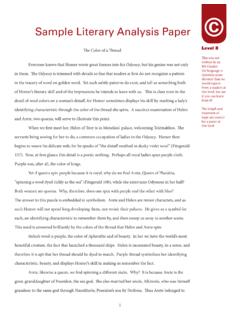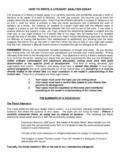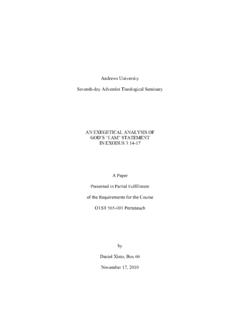Transcription of Sample Literary Analysis Paper - Tapestry of Grace
1 Touching Untouched and Untouched Touching Famous in the Odyssey is Odysseus accusation against his wife s suitors, whom he intends to slaughter for their crimes. Only two men survive the ensuing carnage: Le d s, diviner to the suitors, and Ph mios, longtime minstrel of Odysseus palace. Both men make a plea for life, but only Ph mios escapes the wrath of his master. This circumstance is puzzling because, at least on a superficial level, there is little difference between the two requests for mercy. Both men claimed that they were innocent of Odysseus four accusations. Why then did the pleas of Le d s bring him death, and those of Ph mios, life? The answer has to do with beliefs about the gods, and what was due them. Le d s died because, in trying to prove his innocence, he committed a worse crime than Odysseus had marked for punishment, and in doing so, showed his contempt for the gods.
2 Ph mios, by contrast, was blameless on all four points. To demonstrate this, let us examine first Odysseus accusations, then the plea, guilt, and judgment of each suppliant in turn, beginning with Le d s. Odysseus accused the suitors who had invaded his home of four crimes: plundering his house, seducing his maids, bidding for his wife while he was still alive, and showing contempt for the gods (Fitzgerald 4 0). Le d s, begging for his life, cries, Mercy, mercy on a suppliant, Odysseus! Never by world or act of mine, I swear, was any woman troubled here. I told the rest to put an end to it. They would not listen, would not keep their hands from brutishness, and now they are all dying like dogs for it. I had no part in what they did: my part was visionary reading the smoke of go unrewarded if I die (4 9).
3 There are four appeals contained in this plea. Le d s holds that he personally did not seduce Odysseus maids, that he tried to stop the brutishness (bad manners) of the suitors, that he had no part in what they did, but was only diviner to them, and that it would be morally wrong to kill him because scruples would go unrewarded if he died. Level 11-12 Sample Literary Analysis Paper Such was the plea of Le d s. Now let us examine his actual guilt. Homer tells us that, This man used to find visions for [the suitors] in the smoke of sacrifice. He kept his chair well back, retired by the winebowl, for he alone could not abide their manners but sat in shame for all the rest. Now it was he who had first to confront the bow, standing up on the broad door sill.
4 [he] said: .. death is less bitter than to live on and never have the beauty that we came here laying siege to so many days (395-396). It was Le d s who first tested the bow, who was obviously at the palace to win Penelope. He was ashamed of the other suitors conduct, yes. He did not personally seduce the maids of the house. Yet he still lived as a parasite in the palace. Le d s words, never have the beauty that we came here laying siege to (emphasis mine) suggest that he was a suitor. That was the extent of the priest s guilt. What is most interesting, in light of the fact that Odysseus, who was present to see Le d s try the bow, who heard his words and knew him for a suitor, and who could have justly executed him for that alone, chose instead to base his retribution on the fact that Le d s was soothsayer to the suitors.
5 Odysseus, in judgment, says, You were diviner to this crowd? How often you must have prayed my sweet day of return would never come, or not for years! and prayed to have my dear wife, and beget children on her. No plea like yours could save you from this hard bed of death (4 9). To be diviner to the suitors entailed a litany of actions which, to Odysseus, established Le d s guilt. As the suitors priest Le d s would have offered their prayers .. and his own. His plea that he had no part in what the suitors did because he was a visionary seems suddenly ludicrous; Le d s is guilty of interceding with the gods to keep Odysseus from home. Since it was the gods who had indeed delayed Odysseus return, although apparently not because of Le d s prayers, we can i nstinctively sympathize with the avenger s statement that, no plea like yours could save you.
6 Le d s appeal is to scruples, yet he does not hesitate to admit that it was he who divined for the suitors. He was their sacrificing priest, and must have made prayers for them, as Odysseus 3says. How appalling is his appeal to scruples while he shows such rank disregard for the power and activity of the gods as to suppose that it would be no offense to pray to them against the warrior s return! This is why it was not wrong for god-fearing Odysseus to kill a priest. The priest was either an utter fool who sentenced himself from his own lips; or, worse, an unbeliever who thought it no crime to pray for another s downfall, since he thought that the gods could not hear or would not act. Thus Le d s, theoretically at least able to touch the gods and tickle their ears, was himself untouched with reverence for those same deities.
7 This would indeed earn Odysseus wrath. But now let us turn our attention to Ph mios. The opening line of his plea is entirely familiar - we have heard it from Le d s. The rest is surprising. Mercy, mercy on a suppliant, Odysseus! My gift is song for men and for the gods undying. My death would be remorse for you hereafter. No one taught me: deep in my mind a god shaped all the various ways of life in song. And I am fit to make verse in your company as in the god s. Put aside lust for blood. Your own dear son Tel makhos can tell you, never by my own will or for love did I feast here or sing amid the suitors. They were too strong, too many; they compelled me (4 0). Ph mios makes only two appeals, as opposed to Le d s four. First, he reminds Odysseus of his divine gift for singing, which is powerful and which Odysseus would be sorry to lose.
8 Second, he asserts that he was forced to sing among the suitors, and calls Tel makhos to witness. Why does Ph mios base the bulk of his appeal upon the fact that he is a poet; that he is one touched by the gods? Why would Ph mios suppose that this could sway Odysseus? Part of the answer probably lies in the strain of reverence for songs and poets that we find laced throughout the Odyssey. Song and dance are called the Grace of feasting (6). Odysseus himself said in an earlier part of the poem that, all men owe honor to the poets honor and awe, for they are dearest to the Muse who puts upon their lips the ways of life ( 39). Thus it is perhaps assumed that Odysseus should hesitate to kill a poet, for the simple reason of his vocation. 4 Beyond and above this, however, Ph mios appeals to Tel makhos testimony of his innocence.
9 This is a powerful talisman to dangle before the eyes of the avenger. Odysseus would hardly have been likely to disbelieve his son s word. Moreover, Ph mios has good reason to believe that Tel makhos will speak for him. Let us examine the extent of Ph mios guilt. We first meet Ph mios in Odysseus hall, compelled, just as he said, to sing for the suitors (6). In spite of this, he chooses to sing the story of the Akhaians return ( ). Surely this was a bold thing to do, in the face of suitors who did not want to be reminded of Akhaians returning. The exchange between Penelope and Tel makhos concerning Ph mios song proves that the minstrel had the right to sing whatever he would, and chose to sing about the return of warriors from Troy ( - ).
10 We may interpret his choice to mean that he longed for his master to come home. Furthermore, Ph mios belonged to the household. He was no suitor, but Odysseus own court bard, who could hardly have been accounted a seducer of maids, or a contestant for Penelope s hand, or even a leech, living off the bounty of a home not his. On the contrary! We find him singing daring songs in front of men who could and might kill him for them. This was the guilt of Ph mios, which would equally deserve to be called great loyalty. Now we turn to consider Odysseus judgment. It is a curious one. After Ph mios plea, Tel makhos instantly takes the part of the poet, and then distracts Odysseus attention with a request for his herald s life. Odysseus tacitly consents to spare the poet by taking no further notice of him (4 0-4 ).











